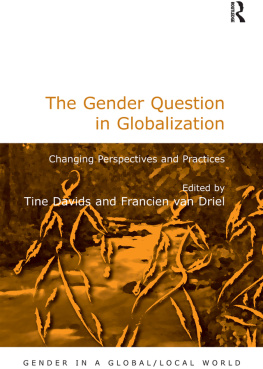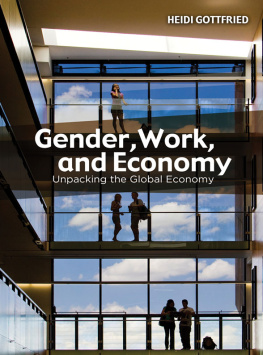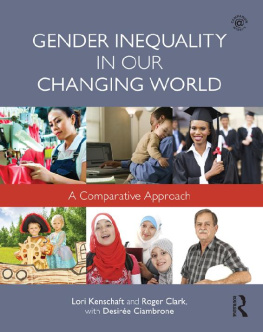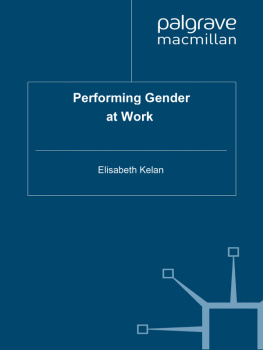THE GENDER QUESTION IN GLOBALIZATION
Gender in a Global/Local World
Series Editors: Jane Parpart, Pauline Gardiner Barber and Marianne H. Marchand
Gender in a Global/Local World critically explores the uneven and often contradictory ways in which global processes and local identities come together. Much has been and is being written about globalization and responses to it but rarely from a critical, historical, gendered perspective. Yet, these processes are profoundly gendered albeit in different ways in particular contexts and times. The changes in social, cultural, economic and political institutions and practices alter the conditions under which women and men make and remake their lives. New spaces have been created economic, political, social and previously silent voices are being heard. n orth-s outh dichotomies are being undermined as increasing numbers of people and communities are exposed to international processes through migration, travel, and communication, even as marginalization and poverty intensify for many in all parts of the world. The series features monographs and collections which explore the tensions in a global/local world, and includes contributions from all disciplines in recognition that no single approach can capture these complex processes.
Also in the series
Encountering the Transnational
Women, Islam and the Politics of Interpretation
Meena Sharify-Funk
ISBN 978-0-7546-7123-7
(En)Gendering the War on Terror
War Stories and Camouflaged Politics
Edited by Krista Hunt and Kim Rygiel
ISBN 978-0-7546-4481-1 (Hbk)
ISBN 978-0-7546-7323-1 (Pbk)
The Price of Gender Equality
Member States and Governance in the European Union
Anna van der Vleuten
ISBN 978-0-7546-4636-5
Women, Migration and Citizenship
Making Local, National and Transnational Connections
Edited by Evangelia Tastsoglou and Alexandra Dobrowolsky
ISBN 978-0-7546-4379-1
Series titles continued at the back of the book.
The Gender Question in Globalization
Changing Perspectives and Practices
Edited by
TINE DAVIDS and FRANCIEN VAN DRIEL
Radboud University Nijmegen, The Netherlands
First published 2005 by Ashgate Publishing
Published 2016 by Routledge
2 Park Square, Milton Park, Abingdon, Oxon OX14 4RN
711 Third Avenue, New York, NY 10017, USA
Routledge is an imprint of the Taylor & Francis Group, an informa business
Copyright Tine Davids and Francien van Driel 2005
Tine Davids and Francien van Driel have asserted their right under the Copyright, Designs and Patents Act, 1988, to be identified as the authors of this work.
All rights reserved. No part of this book may be reprinted or reproduced or utilised in any form or by any electronic, mechanical, or other means, now known or hereafter invented, including photocopying and recording, or in any information storage or retrieval system, without permission in writing from the publishers.
Notice:
Product or corporate names may be trademarks or registered trademarks, and are used only for identification and explanation without intent to infringe.
British Library Cataloguing in Publication Data
The gender question in globalization: changing
perspectives and practices. (Gender in a global/local
world)
1. Women Social conditions 2. Globalization Social
aspects 3. Feminist theory 4. Culture and globalization
I. Davids, Tine II. Driel, Francien Th. M. van, 1953
305.4'2
Library of Congress Control Number: 2005931415
ISBN 9780754639237 (hbk)
ISBN 9780754673224 (pbk)
Cover image design and text formatting by Maarten Slooves.
The Gender Question in Globalization: Changing Perspectives and Practices by Tine Davids and Francien van Driel is the 6th title appearing in the Ashgate series Gender in a Global/Local World, which saw the publication of its first book three years ago. The consistent high quality titles in the series, mostly single-authored, reflect two distinct trends. First, there has been an interesting turn in feminist and gender studies toward the global. This turn has been the result of increased concerns about the (gendered) impact of globalization and contingent international processes. Second, feminist and gender analyses of globalization are underscoring the importance of studying its multidimensionality, in particular the contingent nature of economic, political, social and cultural processes while simultaneously emphasizing the need to engage in local expressions and articulations of globalization.
The edited collection by Davids and van Driel is a reflection of these important trends in feminist and gender studies. As such it provides a state of the art analysis of feminist scholarship about globalization. The editors have organized the book around themes that highlight the triple dimensions of applying a gender lens: the symbolic, structural and subject dimension. This allows them to question concepts such as global, local, modernity and tradition and the assumptions on which they are constructed.
The first section of the collection focuses on the lived realities of women and men, rejecting discourse which victimizes subalterns. Rather than accepting such a view, the authors of this section emphasize agency in a local context. The second section highlights how globalization produces difference in its articulation at the local. Gender(ed) ideas and ideologies, in particular concerning reproductive issues and sexuality, are important influences on or provide mechanisms for local differentiation. The last section sets out to deconstruct assumed, and often unquestioned, global/modem and local/traditional nexuses. The contributions to this section discuss the construction of identity and (traditional) culture in a transnational context as well as hybridity/modemization in a local (Muslim) setting.
The collection by Davids and van Driel is not only a welcome addition to the Ashgate series, but also provides a synthesis of the aims of the series: to study and understand gendered processes and mechanisms in an increasingly globalized world, while simultaneously focusing on the local articulations and differentiation of such phenomena. In other words, it is a must read for anyone interested in keeping up with the latest feminist and gender scholarship.
Gender was high on our research and lecturing agenda long before globalization entered the field of development studies. Once globalization became a buzzword, the relation between gender and globalization puzzled and worried us. In our book proposal to the editors of the Ashgate series, Gender in a Global/Local World, we wrote:
The central theme of this book is the relation between gender and globalization. Our point of departure is that debates on globalization can be characterized as a normative scientific enterprise. Most positions taken in the debate, in particular within developments studies, range between neo-liberal and anti-liberal modernization lines of thought, focusing mainly on a macro-economical perspective. Once gender enters the stage, the meaning of globalization is taken for granted, which results in an unproblematic relation between gender and globalization.
This book is the result of a process of problematizing this taken for granted link between gender and globalization. We would like to thank the series editors, Pauline Gardiner Barber, Marianne Marchand and Jane Parpart, for giving us this opportunity. Their confidence and support in establishing this academic endeavour gave us a channel to express the ideas that resulted in this book.








